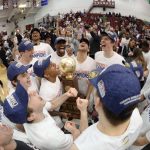Unprecedented: Inside the Patriot League Perspective On Decisions To Suspend Competition In Wake of COVID-19 Pandemic

The weekend of March 8th was an eventful one for those people whose responsibility is collegiate sports competitions.
Like everyone else, Patriot League executive director Jennifer Heppel told me, conference commissioners and the NCAA were monitoring the news as the headlines from the looming coronavirus pandemic was getting worse. The NCAA, after all, had sent out information in mid-January about the possible threat COVID-19 might have on its competitons.
It was the weekend of March 8th, though, where a slew of institutional decisions were made that really put Ms. Heppel on high alert.
In a three-day period, the University of Washington, Rice university, Stanford University, and a variety of smaller schools in those areas announced that they were going online-only the rest of the semester. And Johns Hopkins in Baltimore, who was slated to host part of the Division III men’s basketball tournament, made the announcement that they were going to compete with no fans in attendance.
“While it was certainly something that was on our radar screen,” she told me, “those things kind of made it hit home for me. It was about that time that we were well into conversations with host institutions for the tournaments.”

Logistical Challenge
The Patriot League at this point had a full slate of men’s and women’s basketball planned for the weekend, one of the most busy weekends of the year for those that work in college sports. All rounds were on campus, and Ms. Heppel and the entire infrastructure that allows the games to go on – officials, coordinators, media – were already at their sites. Colgate University in Hamilton, NY had a men’s semifinal and a women’s quarterfinal on March 8th and 9th.
“We’re lucky because our tournaments are not all at neutral sites,” she told me. “So there’s a need to really work hand-in-hand with the host institutions and institutional protocols and to a certain extent, to defer to university and state health guidelines. But as you can imagine, everybody’s kind of trying to work through this same time. We’ve got sites from Boston to Hamilton, New York to Lewisburg, Pennsylvania down to the D.C. area and very kind of different circumstances at that early stage of the game.”
At this point, Ms. Heppel told me, the main questions were being answered on an institutional basis rather than from the NCAA itself. The NCAA’s main focus at that time was determining if and how multiple national competitions were going to take place – not only the men’s and women’s tournaments, but hockey, wrestling and fencing championships as well. With the NCAA focused on their specific competitions, the questions for the Patriot League became ones of the schools themselves.
Ultimately, Colgate University and the other schools on the weekend of March 7th, 8th and 9th chose to go ahead with their competition, including the two competitions at Colgate.
“There was there was a communication that went out to the Hamilton, New York community strongly encouraging healthy behaviors and decision making about attending the game, she said. “And at that point we put in place mitigation measures for the women’s semifinals for the following evening.”
By Monday March 9th, Ms. Heppel and the athletic directors around the league were working on mitigation plans and talking to the individiual schools as to whether they were willing to continue, and how they could do so.
“The NBA’s announcement that they were cancelling the season came as soon as our men’s basketball final finished,” she said. “I remember seeing the alert while I was standing on the court after the trophy presentation.”
/arc-anglerfish-arc2-prod-mco.s3.amazonaws.com/public/AG3HGZVTIFFYRD6BE5YJIO5CFE.JPG)
Online Only
Bucknell was the first school to announce they were going online-only on Tuesday March 10th, with American University, Colgate, Lafayette and Lehigh soon afterwards. Holy Cross and Boston University made their announcements on March 11th.
“We felt like we could do mitigation, then it just started,” she said. “Most of our schools were on spring break. Holy Cross and Loyola had had their break the week before. So for them, it was about planning and notifying. But after those first public announcements of going online only, we knew everybody else was about to make the same announcement. After that, I was on the phone constantly, having individual conversations with athletic directors and presidents gathering information, really setting the table for making a league decision.”
Army and Navy had other considerations as well.
“Part of their mission is physical fitness,” Ms. Heppel said. “And so that as long as they continue to operate as academies, they were going to build physical fitness into their different structure and their daily life. They are a different model.”
By March 12th, Army and Navy announced plans to restrict access to their grounds, which are tourist attractions, and Navy announced that spring break was going to be delayed and ultimately transition to online-only learning as well.
“Leading into making any decisions was and really getting our arms around the information,” Ms. Heppel said, “and the information that the schools were getting from their own health experts that were leading them to make their decisions on an institutional basis.”
These decisions by the schools spurred the decision by the league to suspend competitions.
“You had students on campus that were being encouraged to leave,” she continued. “So across the board, we had multiple conference calls with the league athletic directors and presidents on March 11th and 12th, which resulted in that public announcement on March 12th. That was made at 10:30 a.m. on the 12th that we are canceling the spring sports effective March 16th. And that date was intentional because there were teams on the road that needed to be communicated with and brought home.”
That announcement effectively stopped spring competitions as well.
“It’s also important that while the decision was publicly announced at 10:30 a.m. on that first day, it had been made earlier on so that our on campus leadership had the time to inform their coaches and student athletes directly,” she continued. “There was a strong desire to not have coaches or student athletes find out the information third hand. And while we knew it would likely get out once the conversation started, we were hopeful to contain for as long as possible in order to allow for that internal direct communication with the people that were so directly impacted, especially because there were teams in the room at that point with teams on the road for women’s basketball, for example.”
Ms. Heppel was still in Hamilton, New York when many of these decisions were being decided – meaning she spent a lot more quality time with her laptop in the Colgate Inn than she had planned.
“I get in the car, the phone would start ringing. You take the call and realize I need to go back into the lobby,” she said. “I think I got my car three times on Thursday trying to leave Hamilton, New York, before I was finally successful.”

Chuck has been writing about Lehigh football since the dawn of the internet, or perhaps it only seems like it. He’s executive editor of the College Sports Journal and has also written a book, The Rivalry: How Two Schools Started the Most Played College Football Series.
Reach him at: this email or click below:
